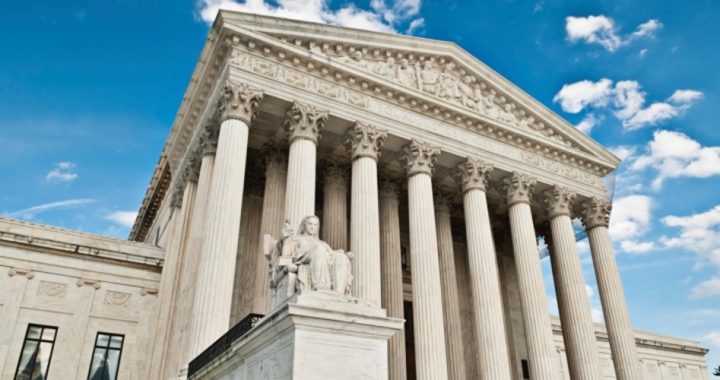
California’s Reproductive FACT Act (AB-775) is facing harsh scrutiny from the U.S. Supreme Court justices on both sides of the political spectrum because it violates free speech under the guise of right-to-know laws.
The case before the Supreme Court, NIFLA v. Becerra, involves crisis pregnancy centers run by pro-life groups and focuses on abortion and free speech, and whether the state can mandate those centers to fully disclose the limitations of what they can offer in all printed or digital materials, as well as promote state-funded access to abortion.
According to the Los Angeles Times, the State Legislature specifically adopted the law three years ago “based on concerns that more than 200 ‘crisis pregnancy centers’ sometimes used ‘deceptive advertising and counseling practices that often confuse [or] misinform’ pregnant women about their options.”
AB-775 states, “The purpose of this act is to ensure that California residents make their personal reproductive health care decisions knowing their rights and the health care services available to them.”
Under the law, pregnancy centers are compelled to prominently post if they do not have a licensed medical provider available.
“It is … vital that pregnant women in California know when they are getting medical care from licensed professionals,” the law reads. “Unlicensed facilities that advertise and provide pregnancy testing and care must advise clients, at the time they are seeking or obtaining care, that these facilities are not licensed to provide medical care.”
Such clinics are required to provide the following notice: “This facility is not licensed as a medical facility by the State of California and has no licensed medical provider who provides or directly supervises the provision of services.”
That notice must appear in all advertising material and is required by the law to be “clear and conspicuous,” defined as “larger point type than the surrounding text, or in contrasting type, font, or color to the surrounding text of the same size, or set off from the surrounding text of the same size by symbols or other marks that call attention to the language.”
In the event that they do have a medical provider, the law states that centers are required to notify clients that the state offers “free or low-cost” access to contraception, prenatal care, and abortion.
The law states that such clinics would have to post the following: “California has public programs that provide immediate free or low-cost access to comprehensive family planning services (including all FDA-approved methods of contraception), prenatal care and abortion for eligible women.” The notice must be at least 8.5 inches by 11 inches and written in 22-point type font or larger in a waiting area, or 14-point type on a printed notice. Centers must offer either a digital notice or a printed one.
These provisions apply even when the centers produce materials simply promoting the message, “Choose Life,” absent of any other medical recommendations.
In 2016, the pro-life centers affected by the law challenged AB 775, but, predictably, the liberal Ninth Circuit Court sided with the state and upheld the law in a 3-0 decision. In early 2017, the Pacific Justice Institute and the Alliance Defending Freedom both petitioned the U.S. Supreme Court to hear the case. The pro-life group Advocated for Faith and Freedom and law firm Tyler & Bursch, LLP also filed a lawsuit to fight AB 775, and on October 30, 2017, Judge Gloria Trask of the Riverside County Superior Court granted an injuction against enforcement of the law, arguing that it violated free-speech protections. On November 12, 2017, the U.S. Supreme Court agreed to hear the case.
On Tuesday, the Supreme Court heard arguments from the state’s lawyers defending the law and from the lawyers representing the crisis centers. The justices, on the Left and Right, did not hesitate to tip their hands as to where they leaned on the law, according to the Times.
Justice Samuel A. Alito, Jr. notes that the law inequitably targets pro-life clinics as doctors and for-profit clinics were exempt from the law, while Justice Anthony M. Kennedy has opined that the law violates free speech by “mandating speech” that “alters the content of the message.”
Justice Ruth Bader Ginsburg observed that the law presents an undue burden on the clinics, as they would have to print the information in large print and in 13 languages on all advertisements. Justice Kennedy made a similar assertion: “It seems to me that means that this is an undue burden. And that should suffice to invalidate the statute.”
In fact, the only one to speak in defense of the law was Justice Stephen G. Breyer, who referred to a Supreme Court ruling from 1992 in which the justices upheld a Pennsylvania law that required abortion doctors to counsel patients on alternative agencies that assisted with adoptions and prenatal care.
“In law, what’s sauce for the goose is sauce for the gander,” Breyer said. “If a pro-life state can tell a doctor you have to tell people about adoption, why can’t a pro-choice state tell a doctor, a facility, whatever it is, you have to tell people about abortion?”
But Michael P. Farris, a lawyer for the centers, countered by arguing that unlike the California law, the Pennsylvania law applied to doctors who were preparing to perform an abortion, a medical procedure.
“Informed consent is triggered by a doctor proposing to perform a particular medical intervention,” he said.
A Supreme Court decision is not expected until June, but based on the statements by the justices, it appears likely they will vote to strike down all or at least most of the provisions of the California law.




